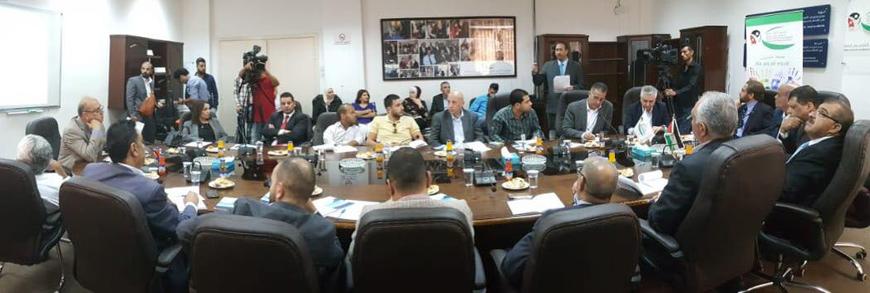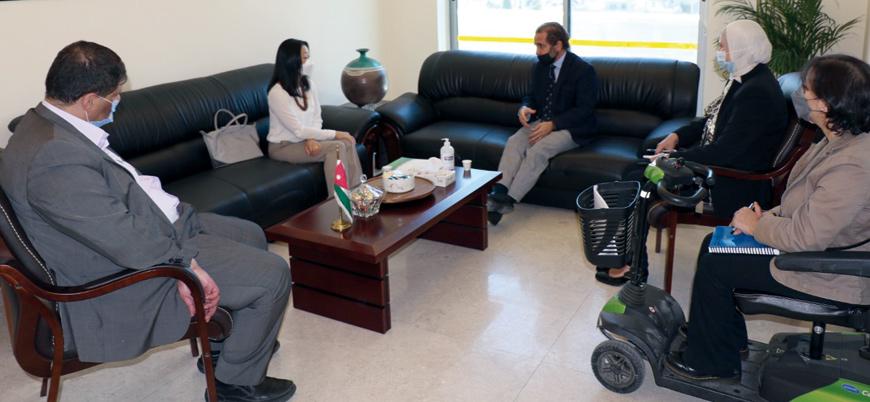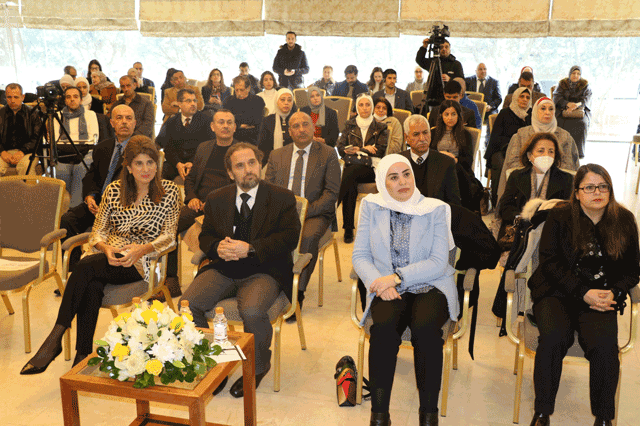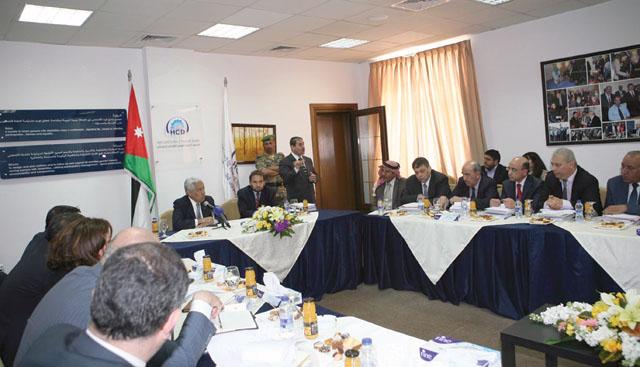You are here
Prince Mired hopes council for persons with disabilities would cease to exist
By JT - Jun 26,2018 - Last updated at Jun 26,2018

HRH Prince Mired attends a meeting with media personnel in Amman on Monday (JT photo)
AMMAN — HRH Prince Mired, the president of the Higher Council for the Affairs of Persons with Disabilities (HCD), on Monday said he hopes that one day the council would cease to exist, noting that this can only happen when all government departments and other concerned authorities start doing their full role in caring for people with disabilities.
Addressing a meeting with media personnel, Prince Mired said until then, the council will continue to do its best to ensure that the rights of people with disabilities (PWD) in legislative, educational, health and any other fields are protected.
Despite the lack of exact figures, he said HCD estimates that 11 to 15 per cent of the population suffers from disabilities, which means that they number more than 1,100,000 people, requiring proper attention by the authorities as well as the society as a whole.
As a start, young people with disabilities should get their chance to be integrated with other children at schools, which is unfortunately lacking because a large number of schools are not properly equipped to receive children with disabilities, who the Prince estimated at around 600,000.
To integrate them in the educational system means that they can later on be integrated in the labour market, which also means that they can be turned into productive members of society rather than be left dependent, the Prince said. He noted that the percentage of PWDs in the labour market is well below standards, and called for more efforts to give them equal chances with other citizens and to provide them with jobs.
But he remarked that it was also essential to make public services accessible for them to enable them to access schools, jobs and government departments.
In general, many public facilities and services, including sidewalks, streets, schools, hospitals and government departments, are not accessible to PWDs, and this means that they might not also be accessible to the elderly, pregnant women and parents with strollers, Prince Mired said.
Improving accessibility is also needed at tourist sites, the prince said, noting that Jordan can easily increase the number of visitors in case its attractions can appeal to many potential disabled and elderly tourists from around the world.
Definitely, all of this requires funds, time, efforts and other capabilities to make services accessible, he said, noting that investing in improving accessibility means that the country can invest in enabling a good percentage of the population to contribute to the economy and the development process.
He voiced hope that PWDs would be able to have a main role in elections as voters and candidates, and would be able to be elected to become deputies, and even to become ministers, to serve their country to the best of their ability. He lamented the fact that parliamentarians rejected a legislative amendment that was intended to raise funds for HCD by imposing 50 fils on each pack of cigarettes , thus depriving the council of badly needed funds to help it carry out its role in caring for and empowering a segment of society that is in real need of help.
He noted that to be able to introduce the required improvements to public facilities as well as to existing legislation needed to eliminate discrimination against and marginalisation of PWDs, there should also be efforts to change the culture and public attitudes towards PWDs, “which unfortunately can be negative due to prevailing stereotypes”.
HCD Secretary General Muhannad Azzeh emphasised the importance of media in fighting stereotypes, which were established by decades of coverage by various media, including television, films and newspapers.
The media, Azzeh said, helped establish negative frames and stereotypes for PWDs that have only just started to be reversed. He said some works of drama used to introduce characters of people with disabilities just for the sake of making fun at disabilities or arousing audience sympathies.
Azzeh urged the media to show more professionalism in the coverage of PWDs without showing any prejudices and without offering any cosmetic or misleading information.
Media practitioners, he said, need to be educated on covering the affairs of PWDs, which prompted the HCD to prepare a stylebook that would be available within weeks.
Deputy President of HCD Basel Tarawneh also highlighted the importance of bridging with the media in a sustainable manner through offering educational and training programmes to journalists.
Tarawneh, who is also government coordinator for human rights, urged the media to play a role in educating the public on the rights of PWDs and to play a key role in lobbying the authorities to ensure that these people get their rights.
Related Articles
AMMAN — HH Prince Mired, the president of the Higher Council for the Rights of Persons with Disabilities (HCD), on Tuesday received UNESCO R
AMMAN — Under the patronage of HH Prince Mired, President of the Higher Council for the Rights of Persons with Disabilities (HCD), the counc
People with disabilities constitute 13 per cent of the Jordanian community, Prime Minister Abdullah Ensour said Tuesday, calling for drawing up plans in every ministry to address their needs

















